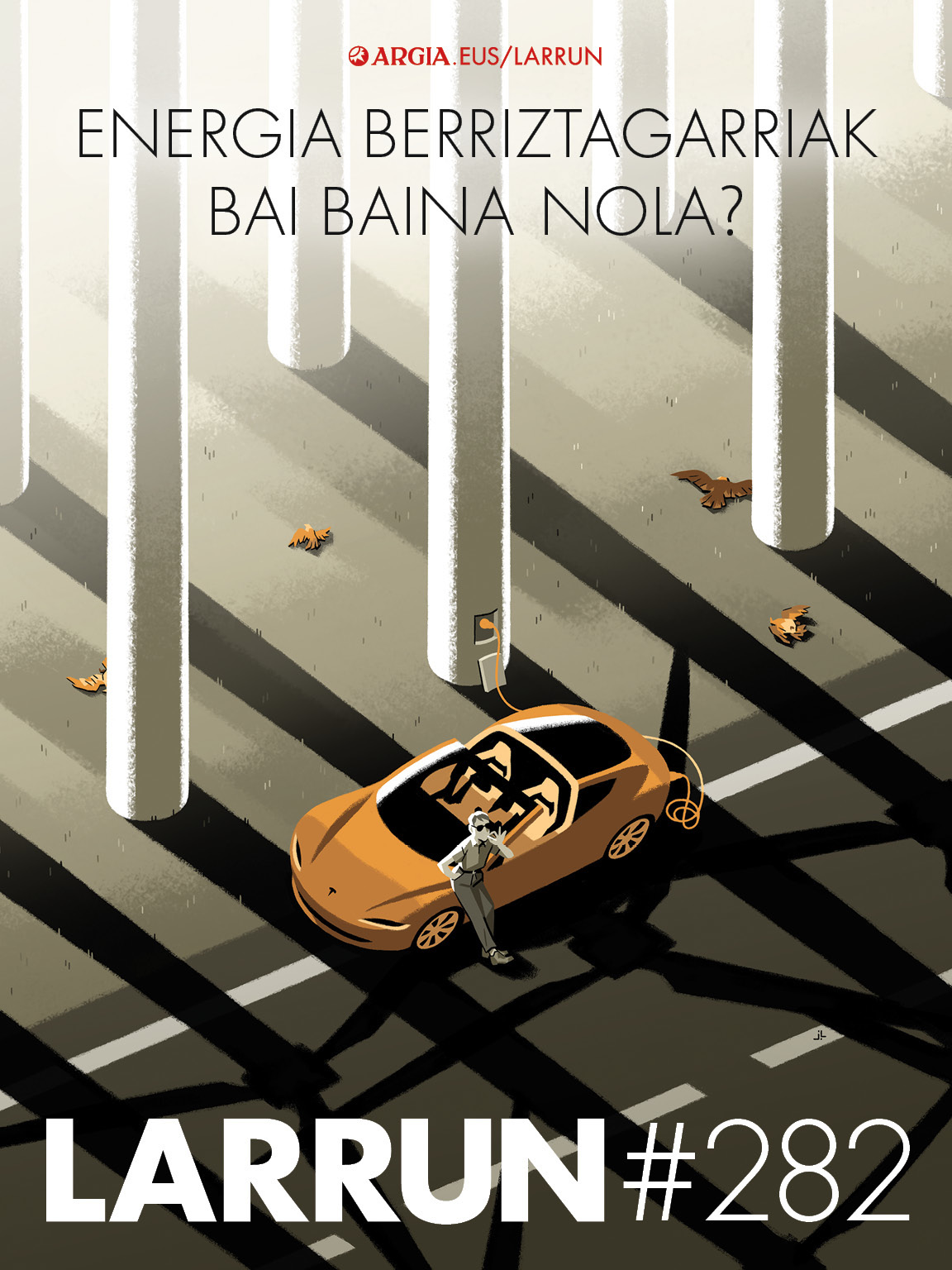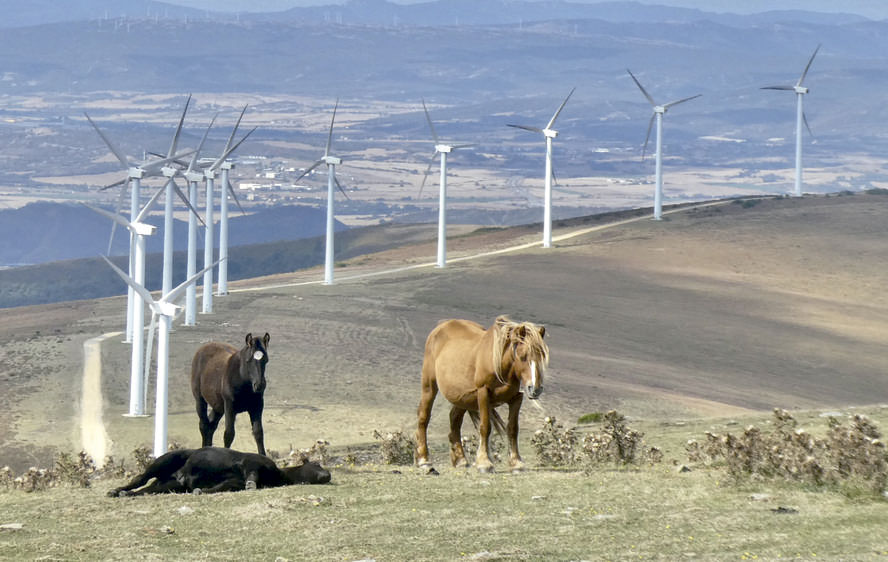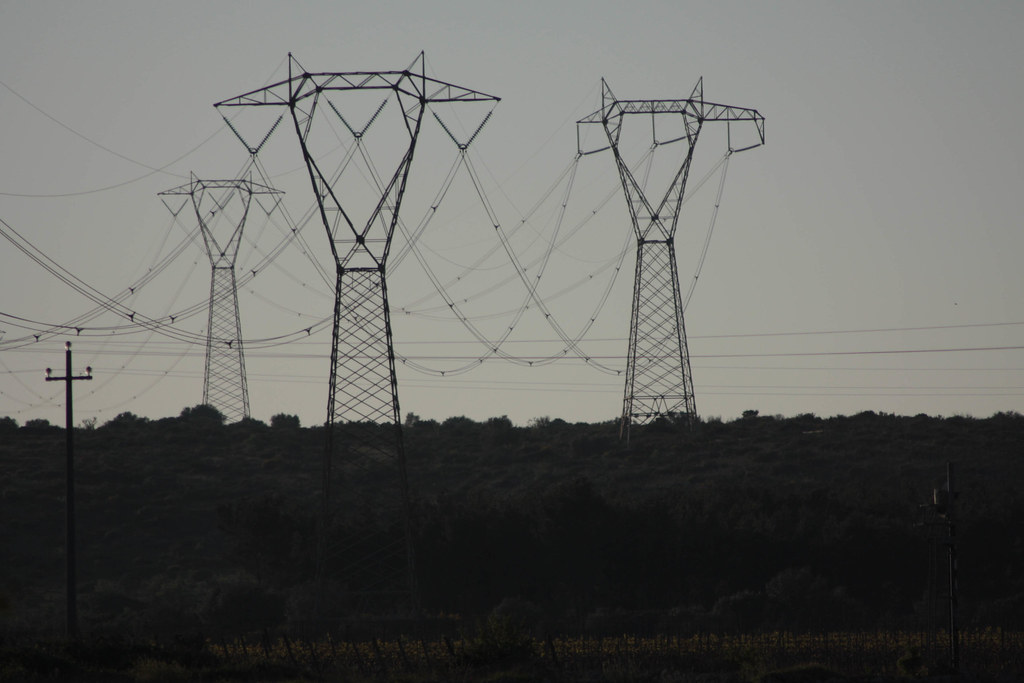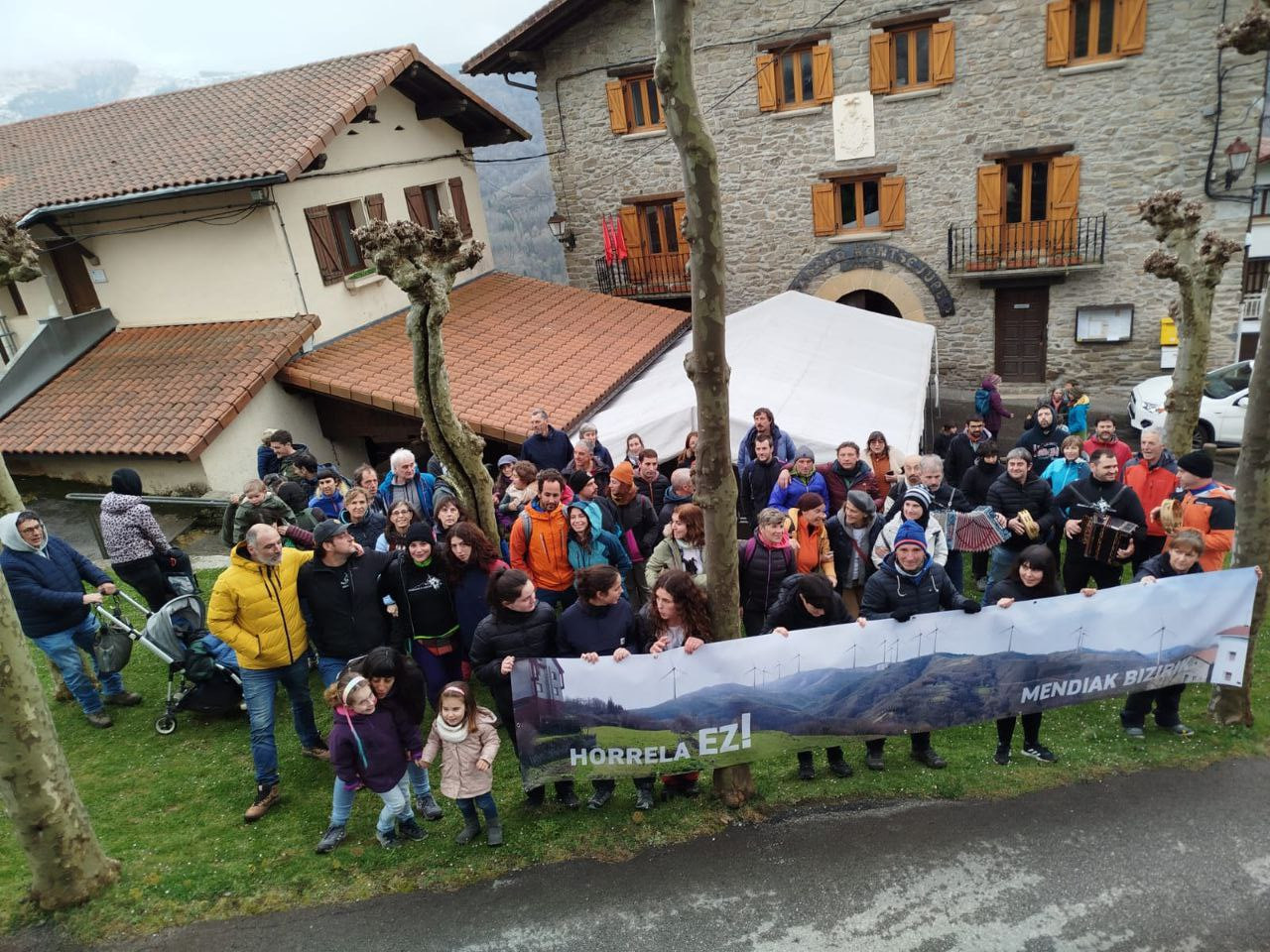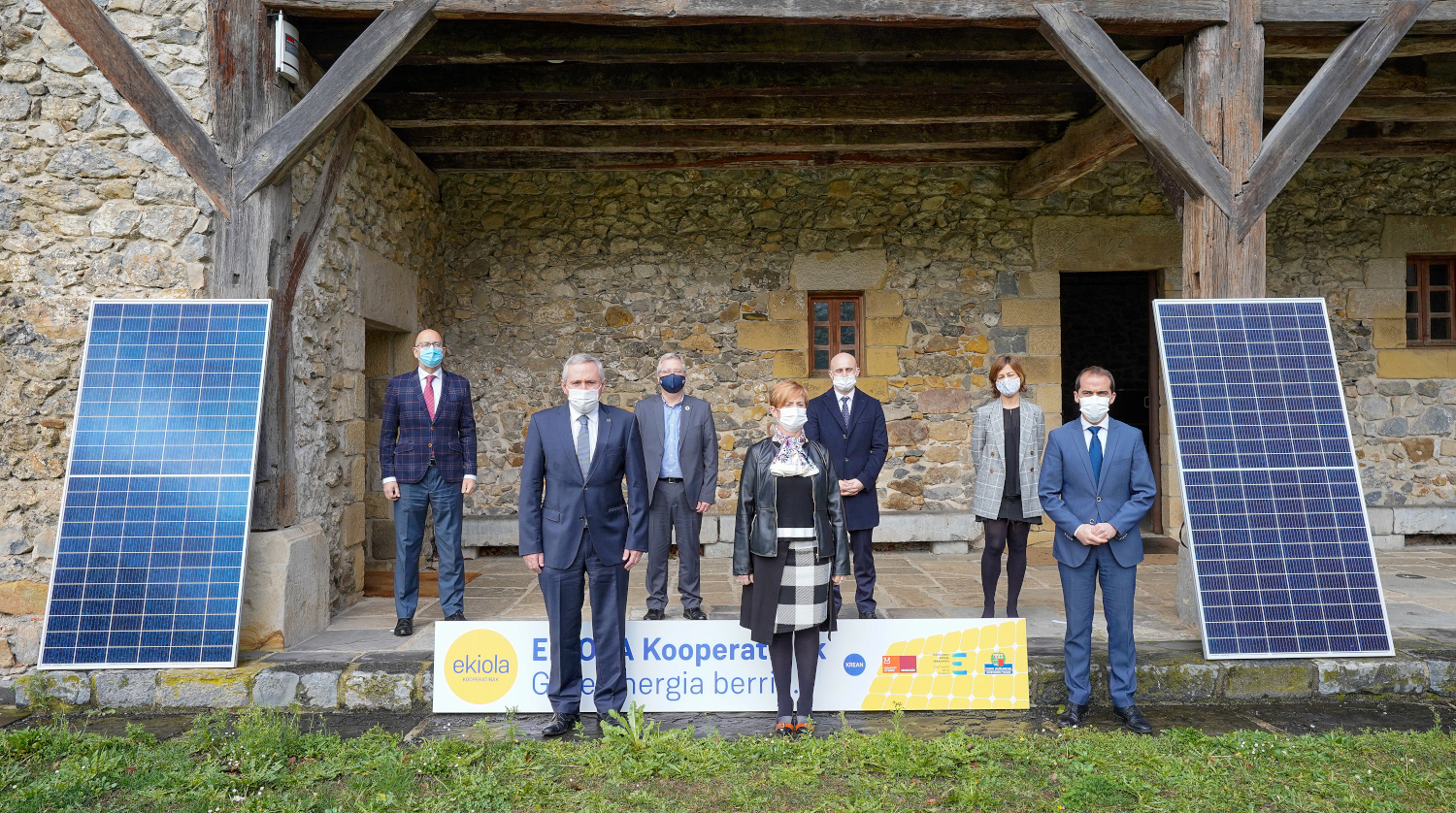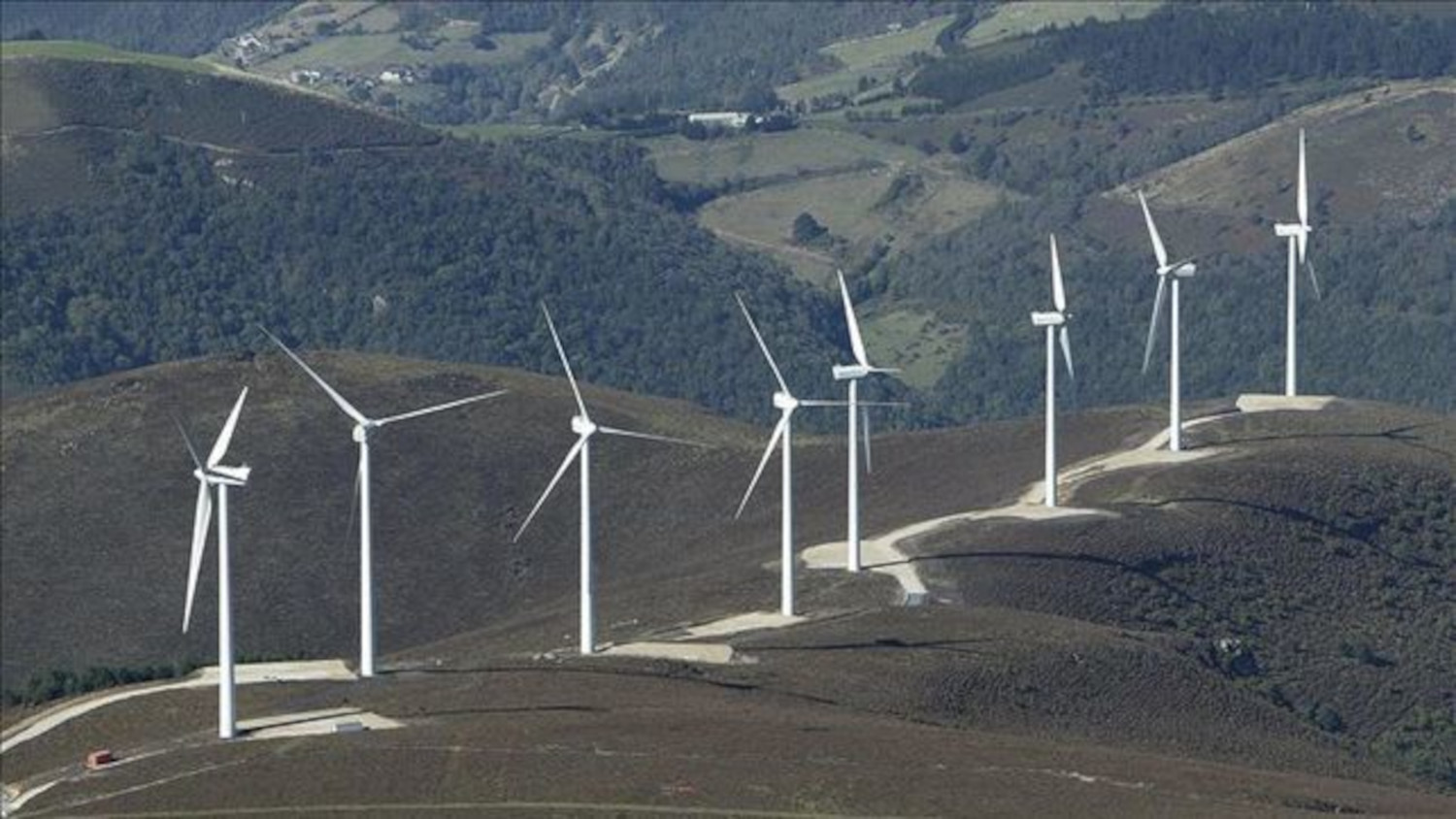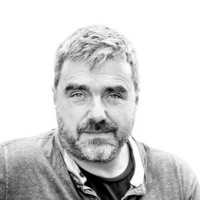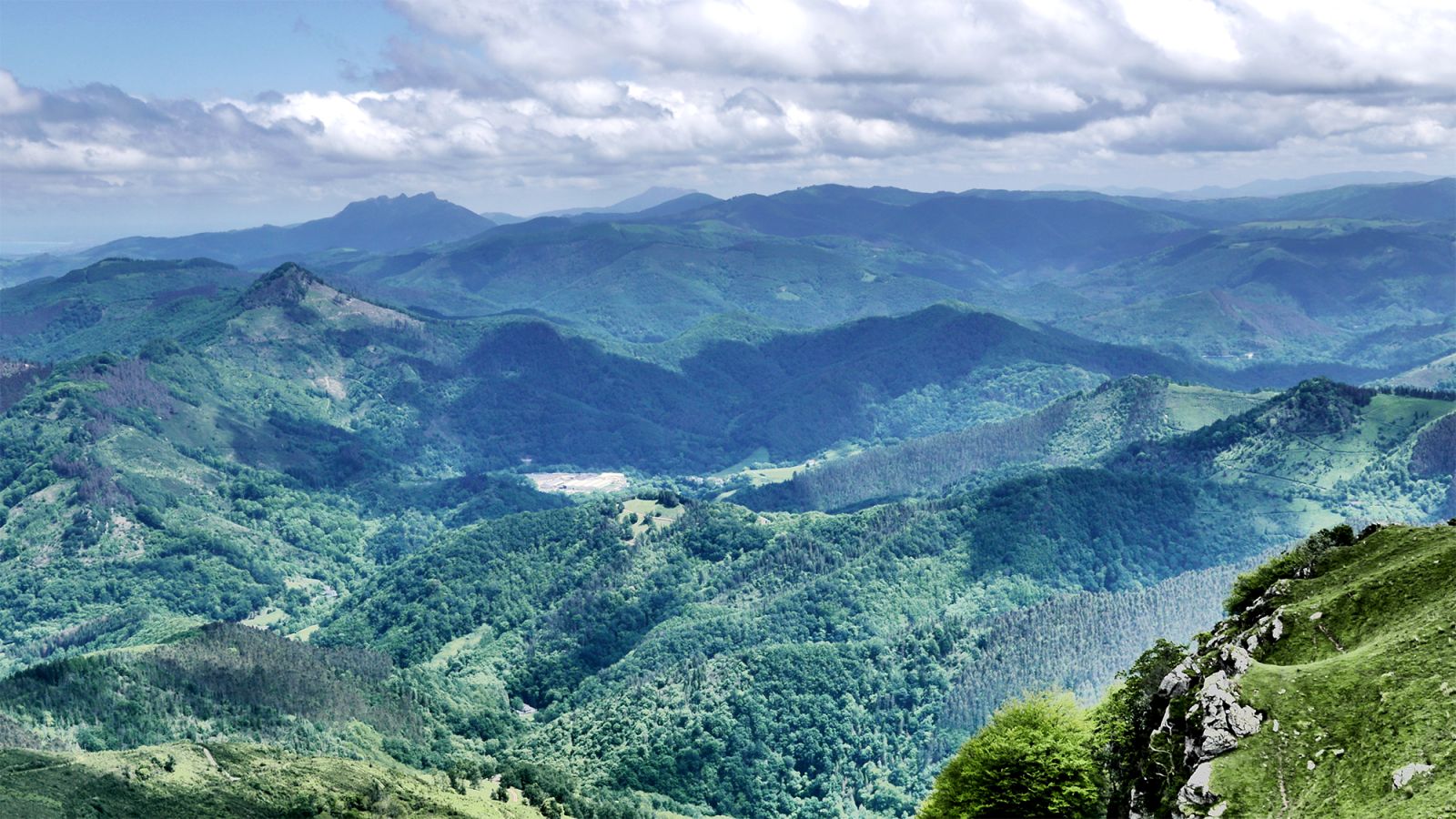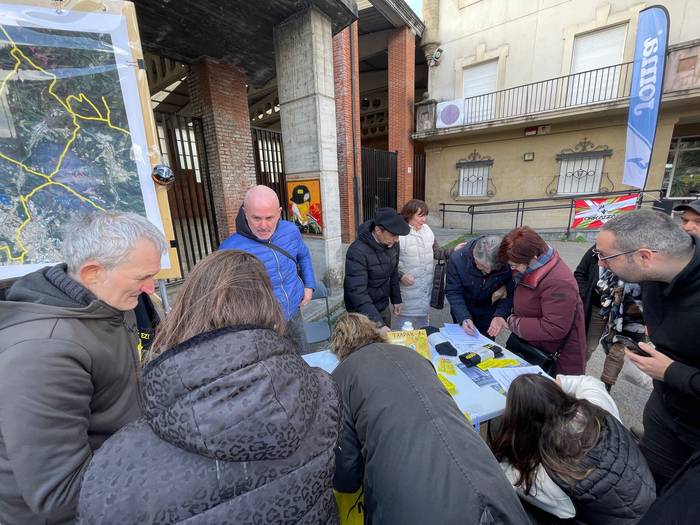Renewable energies do, but how?
- The projects for the implementation of wind farms in the mountains have brought an idea to the public. Is this the way to avoid a fossil fuel-based pollutant system? Mikel Otero (parliamentarian of EH Bildu), Mirene Begiristain (economist at the University of the Basque Country and member of the agri-ecological movement), Jokin Castaños (technician of Goiener, renewable energy cooperative) and Aitziber Sarobe (biologist and nature conservationist) have taken part in the Larrun round energy table. The presentation data of the diners are at the end of the article. In Larrun, together with the round table, we have gathered two opinion papers: the first article was written by two hands, Nicolas Goñi and David Lannes: The fight against mega-projects should not be against renewables, but by the restraint. Goñi is a fishing researcher, mathematical researcher Lannes, and both environmental activists from the Northern Basque Country. The second article has been worked on by the collective, that of Navarra in the Subai Erakuntza foundation: the energy plan presented by the Government of Navarra does not challenge reality.
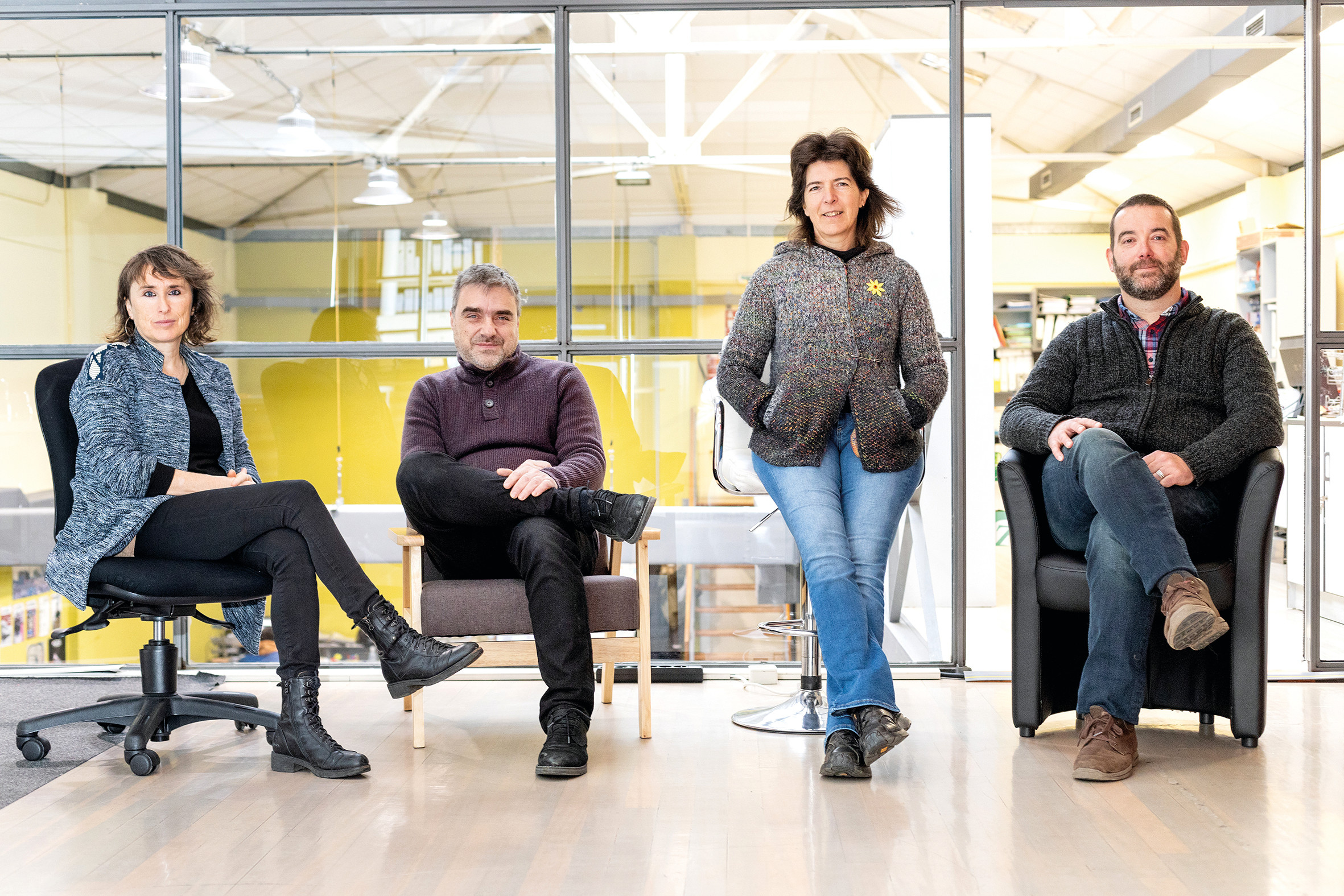
The issue of renewable energy has been pil-pil. Why?
MIKEL OTERO: Because it is a fundamental issue and a prerequisite for everything we do in the socio-productive fabric. Furthermore, the problems of geopolitical tension and price have come in recent times, which has also put the issue on the people’s lips. We are facing a climate emergency, according to reports from the Intergovernmental Panel on Climate Change (IPCC). And in order to reduce the carbon emissions caused by the greenhouse effect, the energy sector is absolutely essential, since 80% of emissions are directly related to the use of energy, more specifically to the burning of fossil resources. This clearly shows us the energy transition and the change of energy source.
MIRENE BEGIRISTAIN: Yes, they are fundamental elements because the current social and economic organization is connected to the environment. In any case, I believe that there are economic interests to speak of gravity in this context. In a situation of alarm and in an emergency situation, the risk of reducing certain social and political rights in the name of gravity is obvious.
AITZIBER SAROBE: Why is emergency and crisis reporting so strong now? The need to understand energy and materials differently comes from the 1970s: the idea of the finite planet is not yesterday. For me, what must be emphasised at the moment is that they want to make all European legislation for the conservation and recovery of biodiversity subject to economic interests. This is a serious matter, because life is at stake, biodiversity conservation.
JOKIN CASTAÑOS: Capital is at stake primarily in a geopolitical framework. They often lead us to someone who has a purely economic interest. But there's another need and context behind it: you're now realizing that we've reached the limits of the planet, that there's not much chance of emptying more planet and that they have to change. In the name of well-being we have done everything, the oil crisis began in 1973 and it is becoming increasingly clear that we could not keep up with this pace.

M. OTERO: I do not disagree with those who have said, but I want to make some nuances. I believe that there have been more alarm situations from the scientific point of view than from the political and economic point of view: in 1972 the book The Limits of Growth was published, in 50 years not much has been done, but in the recent reports of the IPCC there has been a growing alarm, and these scientific alarms have spread to most of society and have been taken over by the UN (United Nations) and other actors. There are different interests among the capitalists, some of whom have received the climate alarm call, adapting their activity to the new situation. But within capitalism there are other very deep interests for things not to change. This is borne out by the fossil and negationist industries. The statements by Josu Jon Imaz are very remarkable in recent times, denouncing to the European Union the urgency in the deployment of renewables. Of course, because it's part of fossil fuels, because it doesn't want the deployment of renewables to be faster. The tendency to continue doing business as before is not overcome: although our controversy seems crumbling vs. green capitalism, today it is not clear whether so-called green capitalism has prevailed over the previous one.
A. SAROBE: As science has measured the current climate crisis, efforts are being made to measure biodiversity loss. We are considered to have entered the stage of the sixth mass extinction, and we do not know the consequences, but we know that we depend on it. We have experienced a pandemic, science has told us that its origin is the loss of biodiversity and we have forgotten it, we do not want to know anything about it. But the climate crisis is very much related to the loss of biodiversity, both of which go together, cannot be understood without the other. Therefore, the solution to the climate emergency cannot lead to a loss of biodiversity and energy generation cannot be developed at the expense of nature conservation. Either we put the two issues together for a future, or ours has.

What is the Basque Country's energy characteristics?
J. CASTAÑOS: The Basque Country is diverse, not the same the large areas of Navarre as the depressions of Bizkaia and Gipuzkoa. But there are two variables to consider: mobility and industry. Raw materials imported from abroad are processed and then exported: we understand most of the industry.
M. OTERO: Our model of society presents us with special energy problems. Our energy consumption is twice the world average, 40 MWh/year per person. Objectively, we have major problems of energy sovereignty: high consumption, 85% dependence on external energy, 80% dependence on fossil resources, little diffusion of renewables… In addition, plans come from Europe but especially from the states, and with our administrative division we have very few planning competences. Inside the paintings that leave us we make small arrangements, but the whole frame comes from another place.
M. BEGIRISTAIN: Among its characteristics would be the disappearance of the primary sector and the disconnection with the territory. It's an economic structure in which nature is conceived as something, and it's understood separately from our environment. The disappearance of the primary sector has meant the relocation of our food system, which has a major impact on the transport system and on food consumption. As Castaños said, we have differentiated realities and there are territories that are more vulnerable to sacrifice, as we are seeing in the projects. On the other hand, we have been educated in a level of well-being, but not all, because today 10% of families have difficulty warming the house: they are very large amounts and we can all be in that situation, so socially we have to ensure that this does not happen.
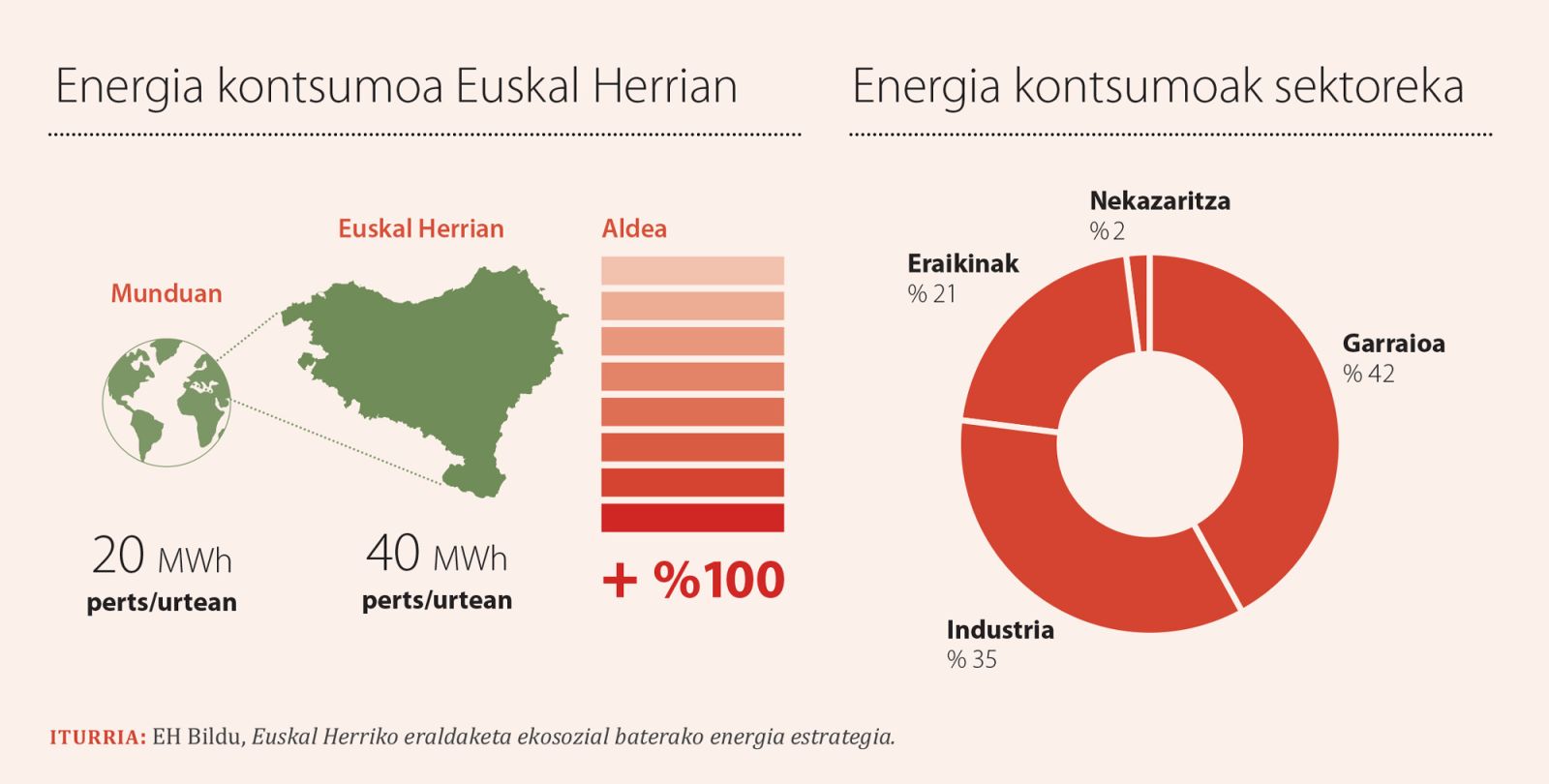
A. SAROBE: Another fact: In Hego Euskal Herria our ecological footprint is over 2.5. That is, we live above the capacity of the natural environment. The planet is unique, math doesn't give it. True to the ecological footprint, we find in depth colonization, based on a logic of superiority among peoples: not only material and energy, but cultural.
Returning to the ecological footprint, demography is a big problem: at the CAPV we have 300 inhabitants per square kilometer. In Navarra the population is 64, in Spain it is 94 and in Europe it is 32. We do not have the land to get the energy we need through renewable energies.
To this must also be added the artificialisation of the soil, which, with the implementation of the recent Spatial Planning Regimes, the Government raised a red alert for the amount of land artificialized in the CAPV. Over the past 20 years, it has been more artificial than in all past centuries, so the conclusion was that we cannot continue to artificialize the territory.
Our orography also has concrete consequences. The slopes we have in Bizkaia and Álava, depending on what and where they are made, have serious consequences: the loss of fertile soil by industrialized agriculture, livestock and intensive forestry. Soil fertility does not recover on a human scale, it takes hundreds and thousands of years. And we are losing tons per ton for various activities, without much thought of the possibilities that in the short and medium term will give us those soils for basic resources such as food.
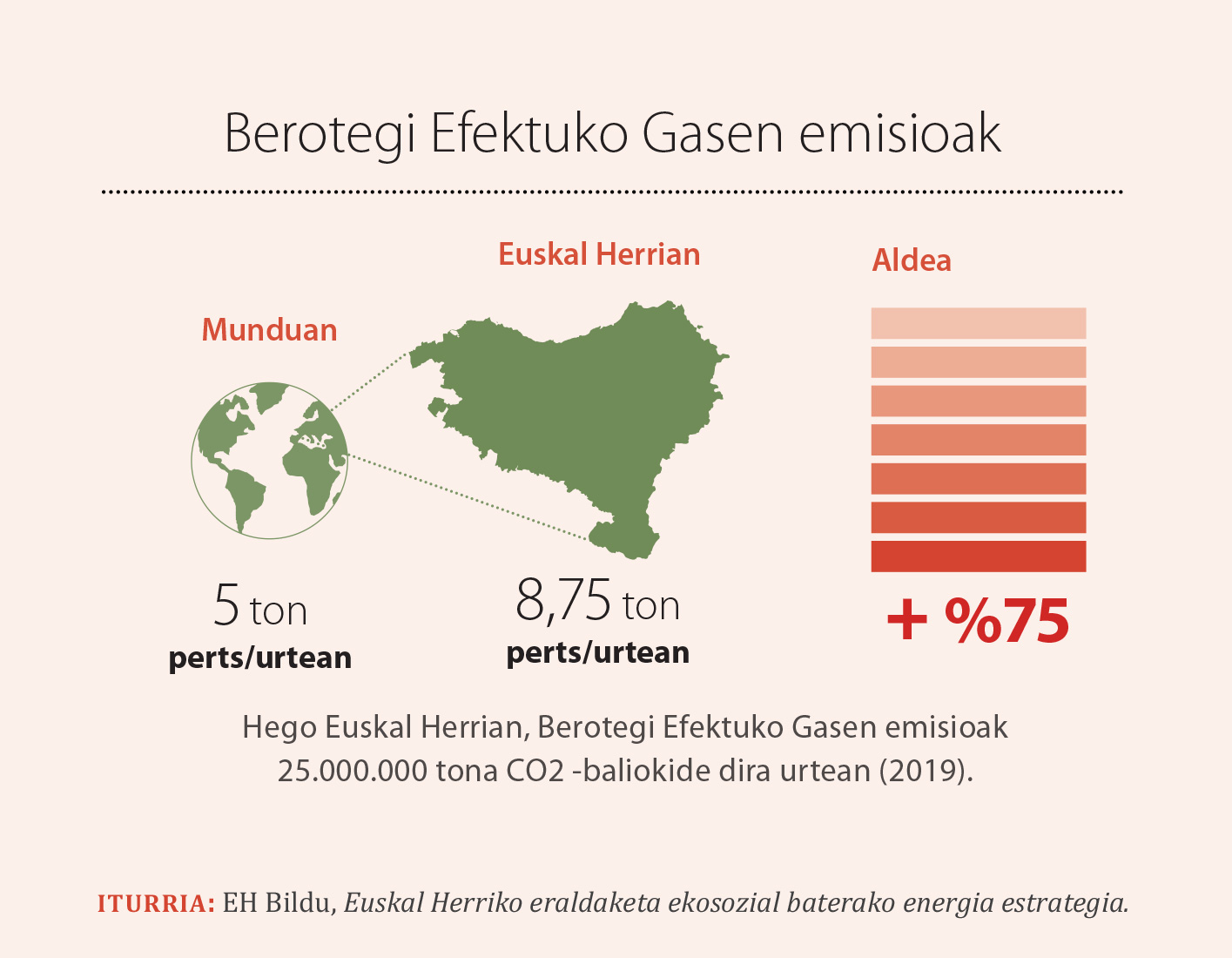
M. BEGIRISTAIN: And Euskal Herria is the south of Europe, an economically interested gateway, as we are seeing on the issue of hydrogen.
A. SAROBE: Yes, it is a step for people’s energy and migration, but also for biodiversity: we are a very special position on bird migration. This should be a major concern in determining wind power sites. But that look is missing.
M. OTERO: We are already an energy step: we refine the double oil we consume in Muskiz and its port is an international energy node, both in oil and in gas. In addition, we have several international links, both in gas and in electricity. And European planning wants to increase interconnections to multiply supply routes by conflict with Russia. With the Pyrenees in the centre, this implies that both margins, both Catalonia and Euskal Herria, are in danger of being a step of major energy lines. Hence the Gatika-Bordeaux submarine cable connection project or the intention to increase the gas interconnection capacity.
A. SAROBE: So I think it's more necessary to think about the system as a whole than ever before. Because all of this leads us to see energy as a business. And there's the lame. In the conditions we have to raise in business terms the interconnections they have put on the table, the energy plans, the “transition” or the “reorganization”? I think not. As long as we don't bring them into terms of rights, and we don't understand that rights are ours and biodiversity, this path leads to loss.
J. CASTAÑOS: Interconnection is important, it is a mechanism of solidarity between peoples. I do not mean that Navarra should generate all the energy for the CAPV, but the interconnection has a technically guaranteed function. Why should Biarritz be left without light if Bilbao has it? We must also build it from our national perspective. You need a logical network connection, not wild, and to be socially owned.
A. SAROBE: In addition to the CAPV we have no other option. Energy sovereignty is a dream, it is impossible under current conditions.
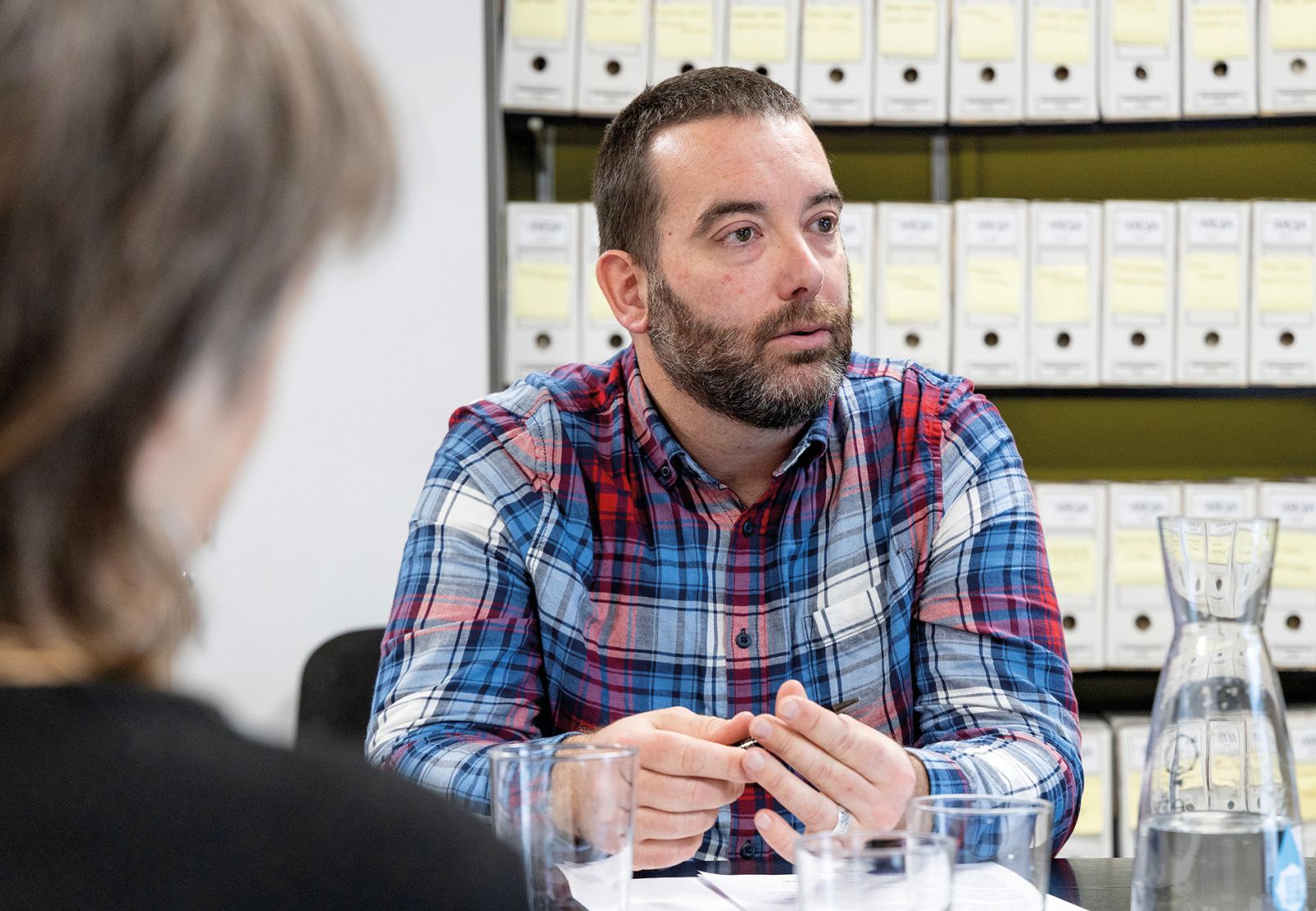
What are the current characteristics of the energy sector and how do they influence the crisis and solutions or the energy transition?
M. BEGIRISTAIN: First of all, we must discuss what is the “energy transition”. It is one thing for Iberdrola and another for the citizens who are developing energy communities. Or "energy transition" is an empty word for those who have difficulty turning on the light. Sometimes behind that word there is a tendency to put social rights and economic interests at the same level and I think it is a false solution. They're not on the same level.
M. OTERO: What is the “transition”? Go from what you have to something you imagine. But starting from their reality. Otherwise, we would be talking about turning.
J. CASTAÑOS: they begin to talk about the Community transition in Europe. Not yet.
Turning to the characteristics of the energy sector, I would say that those who wanted to make money with the liberalisation of the market have earned money and we are paying all the damage, including them. It is a very vertical, oligopolistic and monopolistic model. The property is in the hands of a few. There has to be social empowerment so that the energy sources are really the country, and if that is not achieved by public policies, it is the people who have to organize and start appropriating. If the model is not changed, nothing will change.
M. BEGIRISTAIN: With liberalisation they have made full use of these energy infrastructures and have now moved to another niche of business through digital green capitalism.
M. OTERO: Yes, some who were previously climate change deniers have now become negotiators, because there is a huge niche of energy business. And the vision at the other end is the social function of energy, that is, what minimum energy needs must be guaranteed to all in order to have a dignified life. Between these two perspectives there is tension or dispute, before, now and after.
In the 1990s, and at the instigation of the European Union, most of the large companies linked to the public energy sector were privatised and the sector deregulated, avoiding part of its social function. We are facing the impulse of neoliberalism of 40 years, and there are monstrous forces. Today, investment capacity, knowledge, control and power are in a few private hands, we don't have a strong public sector. And that's the argument. Transition means dispute.
A. SAROBE: You just got to the bone. Here's a weakening of the public system. The key is the benefit of the public system and revolving doors: it is clear who sits in the dashboards of these semi-public entities and where they come from. And at its origin is the privatisation of infrastructures built with public money.
The source of renewable energy is the sun. Who is the sun? If you have to start changing something, you have to go down to ownership and make change, if you're not going to continue in the logic of business, and it's going to be hard to imagine transition as a solution, if you want to understand transition in terms of rights, as a solution that guarantees well-being and health for all of us.
M. OTERO: Sarobe, says that if things don't change very much, there's no possibility of transition. And I would turn it around: transition is precisely a tool to change things and give the fights that must be given in that way. If you're waiting for things to change, you won't be able to start the transition.
In transition, we have to make that path so that things are different. Since EH Bildu, we have to discuss ownership and democratization of all scales, and all technologies. That is why I think we are doing a bad job if we represent the energy transition only in our domestic consumption. No, no, how will industry consumption be fed? With what infrastructures and with whom? That too must be discussed.
A. SAROBE: When I say we need big changes, I mean change of direction. The only possibility I see for transition is change of direction. Because this direction of Green New Deal that has marked us neoliberalism, this green capitalism, leads us to a future in which, on the path of the wealth of some minorities, we are allocated crumbs, I do not know how. But it does not seem that that is where we want to build a real alternative.
J. CASTAÑOS: When I hear the word transition, I am led by the political transition we have experienced in this country: and in energy we must democratize, but real. On the energy issue, what is going to really change in the transition? What do we want to maintain the current model and level of consumption with another type of energy? This is not feasible, either ecologically or economically. Consumption must be reduced. We have to adapt our lives, because they are able to generate energy. There is no more. We use the word transition, but what needs to be done is a moderate adaptation. We must understand all this as a process.
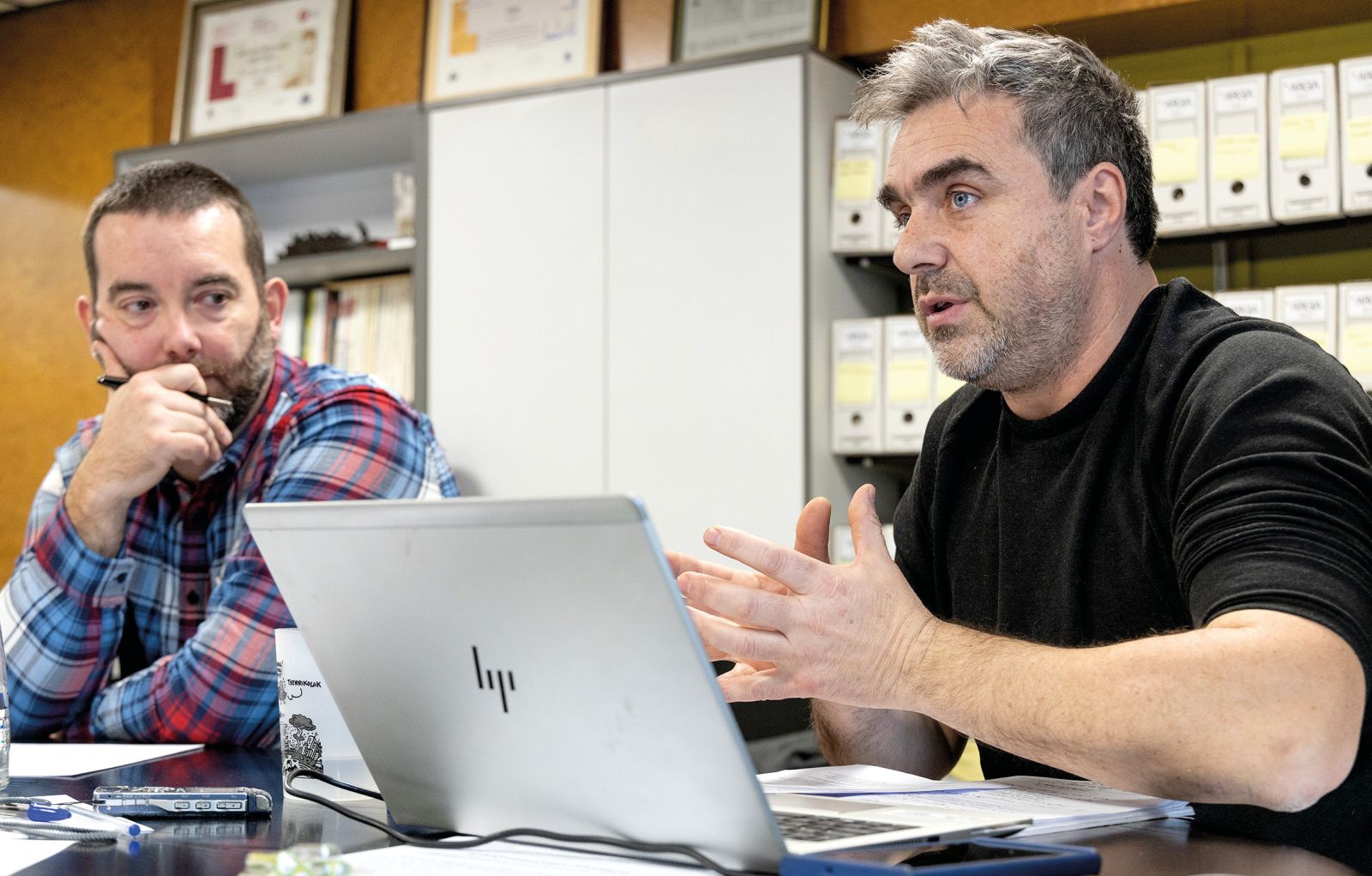
What are the goals to achieve so that our system is not based on fossil energies?
M. BEGIRISTAIN: When setting objectives, I think it is important to analyse the energy needs of society and to propose consumption cuts. We also have to look at who we consume because we don't all start from the same place. Secondly, we must see to what extent this renewable energy that is to be generated will actually replace the production and consumption of fossil energies. This must be planned if emissions are to be reduced. And the third question is, knowing the current socioeconomic texture, why will we use this energy for? When we talk about transition, we need to talk about socio-economic transition. Several questions are being asked: what socio-economic structure do we want? Will we define these objectives in Gross Domestic Product analyses? Because we know what our economy has been: the exploitation of natural systems and lives, and we have to break this logic. And there we have kept some more than others, because we are in the capitalist system, but also in the patriarchal system, and we come from a colonialist system... When setting objectives we cannot ignore them again. I know we are in the emergency and we need answers, but I think we have to take an opportunity to set those objectives. Otherwise, in the name of urgency we will refocus socio-economic structures on oppression.
A. SAROBE: Yes, when targets are measured with indicators such as GDP, environmental impacts are not taken into account. If we measure the current prices of fossil and renewable energies in terms of the environmental damage they cause, we would find that they are very cheap: the most expensive we have paid is also zero. One of the keys to the transition is here, how we will quantify these environmental impacts, so that that renewable energy we can generate is considered “good”, “profitable” or “sustainable”.
On the issue of lateral damage, we have also reached the perversion: Arantza Tapia recently left us saying that they will put sensors to stop windmills if the birds pass. What harp is this? And I've actually seen an inadequate response from those in technology: Do we really have to believe that technology is going to get us out of this port? The main message is, "Let's avoid the law of nature protection, overcome the laws that paralyze us, so that in the name of gravity we can accelerate the context and the process that brings us here."
M. OTERO: It is a deep, yes, urgent debate. It looks like it doesn't allow us time to think. You said that we have to take the opportunity to set targets, but that stop you say has risks. As you take the opportunity, things continue in their perverse direction, which paradoxical if you talk about stopping everything, don’t hesitate that it is the sinking of what we know, catching everyone, and especially the most vulnerable.
Mr Sarobe, what about renewable energies? Of course! The cause of the damage is the immense use of energy, but at the time of the transition they become balanced: renewables produce environmental damage, but they replace fossil energies and the ecological damage of the current system based on fossil energies is enormous, higher than that produced by renewables. It is therefore in favour of renewable balances. The spirit is that, otherwise it is getting or not. Saying that the expansion of renewable energies has only ecological damage can lead to paralysis and paralysis will not lead to a transition.
M. BEGIRISTAIN: It can lead us to paralysis or not. It needs to be questioned and questioned. When I say the stop, I mean that we have to create a space for healthy debate. Of course, we can't stop the world while we make decisions. But today, tomorrow and the past, things are being decided in a concrete direction: where we are going to build the renewables, for whom is the energy to be produced, to whom is it going to remain… We have to take a space to say: “Today is deciding this and we do not want it to be so.” It's my concern, are we occupying that space? What social trust do we have for whom and to whom does this transition benefit?
A. SAROBE: In addition to the situation we have to build a different direction than the one that has brought us here, if not, we are not going anywhere.
M. OTERO: The main field to be fought during the journey is the one to be carried out for the benefit and direction. I insist, as we do. Focusing on the concrete objectives, those we have raised in EH Bildu to align with the climate goals are, on the one hand, that energy is 100% renewable, avoiding fossil and nuclear energies. On the other hand, as far as possible, energy generators should be in the Basque Country: we must increase the share of sovereignty, increasing the rates of self-sufficiency. This is strategic because the availability of these infrastructures provides us with local energy and control capacity in the future of such energy, although we will have to continue to provide energy from outside (but as little as possible). And another objective is to guarantee the right to a dignified life, access to minimum energy welfare.
A. SAROBE: I would add a point to these objectives, which to me is a condition: climate change policies must be aligned with biodiversity policies. This is the starting point, we have to include biodiversity in the equation. I agree with the objectives you have said, but I do not imagine how these objectives can be achieved without depleting the natural sand of our territory. Or without losing the potential for conservation of current elements of biodiversity. There's the lame. We have linked the climate crisis to emissions and CO2, but also to biodiversity loss. They go together. That's why it's a condition for me.
J. CASTAÑOS: Renewable energy is renewable, but transforming it is not so renewable. That's the key.
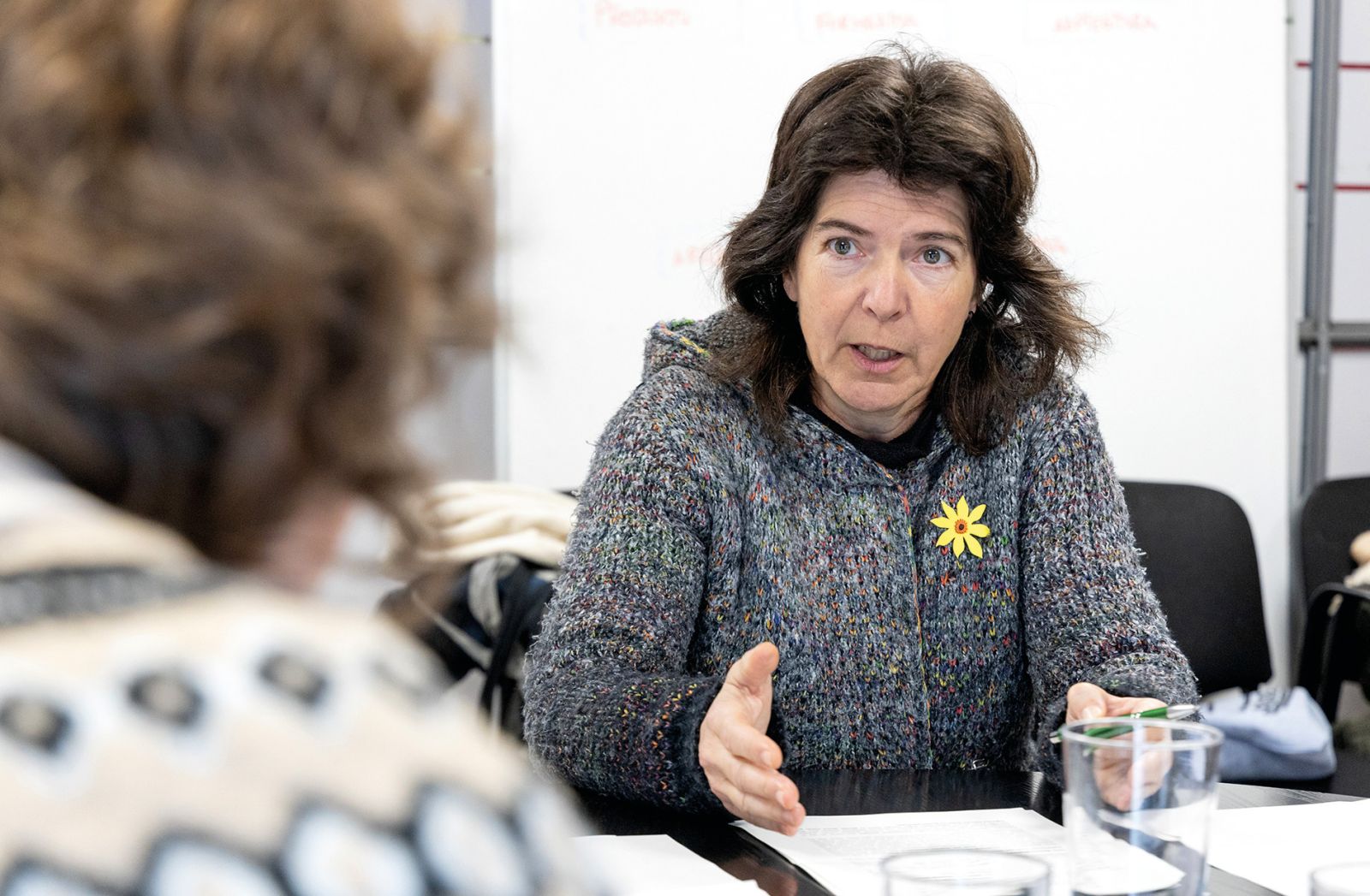
What is the road to these ends?
J. CASTAÑOS: Technology won't save us. Technology is a tool, but not a solution. The solution is a model change.
M. BEGIRISTAIN: I agree, in the energy transition we need social solutions than technological solutions. The knot we have to release is social. And the issue is not just the energy transition, we need to talk about the socioeconomic transition. We should rethink the economy we want to build and the relationship we want to have with nature in the future.
M. OTERO: EH Bildu sees it very clear that what green capitalism sells is not possible, that is, to change fossil energies for renewables and to continue with the logic of growth. Among other things, a significant reduction in energy consumption is required.
Three are the axes on which we turn the change in the energy sector: on the one hand, the issue of consumption, which must be done by sector. In order to do this, different solutions are being proposed worldwide: electrification processes, heat harvests, closer supply chains... and, in addition, one must question individual consumption from the demand for consumption, review the energy footprints of our habits, that is, we need a cultural transformation, reflecting on our leisure and day to day. Moving to a desirable number, we are considering halving consumption within 25 years.
Secondly, we are proposing the development of an economy close to circularity, generally rethinking supply chains. In it, food sovereignty is strategic, along with the impulse of agroecology and diet review. And in what is often called the “circular economy”, we have to work on waste management and the reuse of materials.
Thirdly, we raise the intervention of the public authorities: the GDP bias and the development of a more complex indicator that also includes environmental damage; the planning of the fair transition to compensate those who will lose in employment and income; the guarantee of the redistribution of wealth through taxation; the promotion of the nearby economy through public procurement ...
A. SAROBE: I have no objection to saying that we need deceleration, because I do not imagine it as a tragedy. Reading the data of the scientists, what I understand from the slowdown is a reality that will bring us much less material and energy consumption, something that is not this compulsive consumption so far. That's why degrowth is an opportunity for me to create a new life and culture. It is clear that from this globalised world we will have to move to another reality, much closer, more localised, more humane, more Community, with lower consumption. So I imagine reality, and for me it's an opportunity.
M . BEGIRISTAIN: The slowdown is here. It is clear that we are in a situation of exhaustion of materials and resources, and we are also in a crisis of social protection and care. So we don't all start from the same place to look at disaster. Of course, the slowdown interposes several privileges and some of us are more interested than others.
Deceleration is associated with a tone of terror, as it requires a drop in material terms, but it must be said that the logic of growth has not led us to the paradox either. Some have led more than others, but at the same time it has led us to a society that lives with a lot of stress and speed. I believe that capitalism is interested in opening up the negative idea of slowdown.
Deceleration requires the relocation of the feeding systems, the rethinking of the mobility model (the electric car cannot replace the gas oil)... That is why I believe that the decline is to grow as a society. Society needs internal growth to incorporate the logic of slowdown.
And what do we need for the growth process? On the one hand, we need technological tools from the standpoint of sovereignty. On the other hand, we must socialise the problem: moving the debate to the neighbourhoods and peoples, and talking much more about the problems we have and the possible solutions. There are solutions from the left in certain villages that are being built, from the perspective of social innovation. In the transformative social economy there are possible mechanisms and solutions, and we have to develop economic projects of a transformative social economy, which will involve the construction of the logic of slowdown and other values. But the green and digital logic of capitalism is dominating, and there's a big argument, which economic projects we want to launch. It is time to make other political bets and to build other economies within the limits.
M. OTERO: In the current parameters, a great decline is related to layoffs, to the deterioration of general living conditions... What will we desiccate? What do we need less industry? College professors? Goiener workers? Firemen? What does degrowth mean in the materiality and living conditions of our daily lives? Begiristain said we need other economies and logics, we need a transformative social economy and local energy communities… Okay, let’s scale: let’s talk about MW.
As can be seen from our calculations, energy consumption would be reduced socially by half with great efforts. And the supply of the other half requires a huge expansion of renewables. Therefore, if more powerful numbers of growth are raised, we must also talk about their consequences. Because it has important consequences in the sectors and in the lives of each of us: not only in this great industrial energy consumer, but in our entire welfare system, in hospitals, in schools...
A. SAROBE: In some sectors we will need complete reorganization. For example, I am seriously concerned about transport, seeing how many people we work outside the home and because we do not have the possibility of going on public transport to work. We will discuss positively how we reorganize transport in our country to be public, without private vehicles.
For me, the playing field is local communities and their logics. I believe that there is one solution: to understand energy as a Community law. I am clear that the solution is Community, not personal. If we have to bring life to a smaller scale and adopt other consumption habits, we have to make total cultural change in the community, progressively and organized. We need planning, we need policy. Because disaster is going to come, and if we don't do it in an organized, messy way, it's going to come as nobody wants.
M. OTERO: I agree, the energy communities are very important and in any area there is much to do, but we do not avoid the polemics of renewable energies. You can create an energy community, but in your work, like in Mercedes or in Arcelor Mittal in Olaberria, you have to put the energy in taps. And that's not going to be given to you by the local energy community. This leads us to talk both about feasibility, supplies and some infrastructure to ensure supply. Always within the logic of growth or consumption reduction.
“Citizens need a trade. But there is where to work in this country if it is not in that massive industry”
Jokin Castaños
J. CASTAÑOS: Citizens need a trade. But there's where to work in this country if it's not in that massive industry.
M. BEGIRISTAIN: We must rethink work and employment. We must redefine what the key tasks are and what tasks must be reduced.
A. SAROBE: And we must also look at the commodification of work, because there is a lot of work that is not commercialized.
BEGIRISTAIN (LDR). — (FR) Mr President, I should like to begin by congratulating Mr Begiristain on his report. The question is, how do we respond to the material and consumption needs of our energy and where will we put windmills? Should we start from windmills?
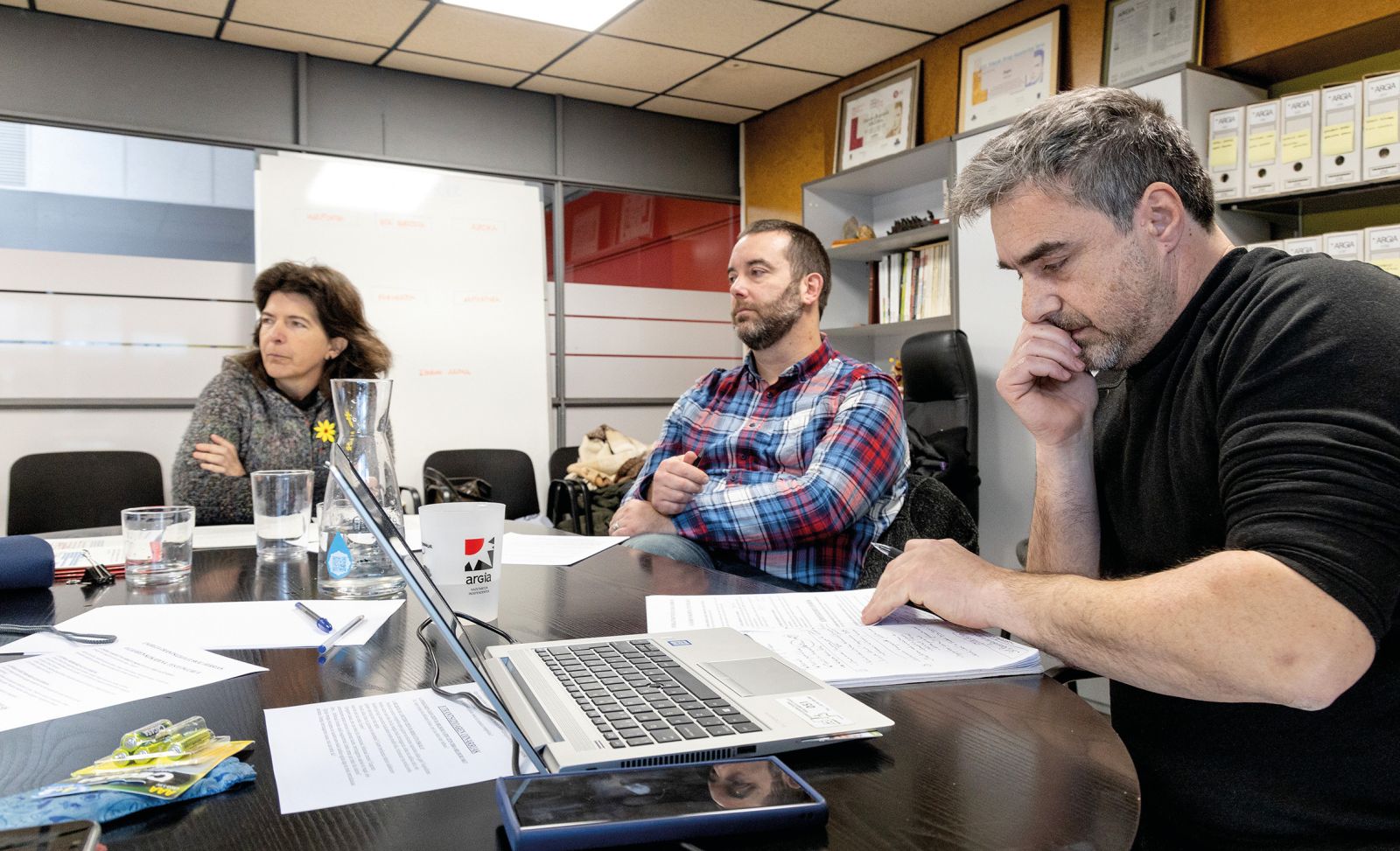
Where to locate renewables? Are there red lines?
M. BEGIRISTAIN: We cannot talk about energy sovereignty without talking about food sovereignty. The energy strategy must be built with the food strategy, the transition must be combined. We must do this as soon as possible if we do not continue to artificialise the territory. In agroecology we have many studies and numbers, but we lack a comprehensive exercise: we don't cross the issues of energy and food in the exams! How can we have come here without unifying our eyes?
According to Biolur's calculations, taking into account data from a basic diet of the current population of the Basque Country and the Spanish Food Safety and Nutrition Agency (AESAN), we would need about 400,000 hectares to start guaranteeing self-consumption. According to the latest agricultural data from the INE and the Chamber of Agriculture, in the Basque Country there are almost 900,000 hectares of agricultural land available. But this figure of 400,000 hectares is a starting point, as the necessary resources are needed for each production, the climatic and production conditions and the proper use of the land: nurseries and production of seeds, rotations, livestock grains... In addition, they are variables to adjust the diet of society and the projection of population growth, and in 2022 more than four million tourists visited the CAPV. Artisanal fishing should also be ensured in the first 12 coastal miles. Consequently, generating jobs in the primary sector would make an important contribution to the new socio-economic structure. However, a forward-looking food sovereignty strategy would be needed to make sense of all this, and it is therefore necessary to plan the energy transition along with food needs.
“Our food is in trucks, not on our floors. And the energy used by trucks is not renewable”
Aitziber Sarobe
M. OTERO: I agree. We have to put the data on the table: the amount of land we have to cultivate, the type of land we need, and then we have to look at how to make food compatible with the supply of energy. Because in future we will have to do a great deal of energy supply on our territory.
A. SAROBE: I'm afraid of the lack of food sovereignty: our food is in trucks, it's not in our soils. And the energy that trucks use is not renewable, and in the medium-long term, there's no technology to represent this whole mobile park, either with hydrogen or anything. The problem is fat.
“Leaving the territory in private hands means a tremendous loss of sovereignty. The territory is the basis, what kind of sovereignty will
materialize if not?”
M. BEGIRISTAIN: On the other hand, leaving the territory in private hands, we enter a tremendous loss of sovereignty. The territory is the basis, what kind of sovereignty will materialize if not? The rural environment must therefore have a red line. It's hard to talk about, because we see nature as something, on the one hand, and on the other, because there's a very urban gaze.
J. CASTAÑOS: The camp should be untouchable, I share this red line. Because if today we occupy fertile land, tomorrow we may have to decide to carry or eat the cell phone... And in that choice I am sure, one is essential.
M. BEGIRISTAIN: The location of renewables is closely linked to spatial planning. That is why it should be a social scandal, how the government is currently giving project permits, when the Spatial Planning Plan is not yet approved. This shows that the objective is the construction of renewable energies to increase energy production, passing public resources to private hands on the excuse of private public alliances, artificializing the territory, endangering future generations with the worst climate situation ...
A. SAROBE: For this gigantic business of green capitalism, moreover, the only opportunity we have for sovereignty has been outlawed in a very savage way, that is, land management. And that hasn't started in Europe, here it has started, with the Tapia Act. We have been pioneers in this.
J. CASTAÑOS: The debate is lacking, it is at the political level, but at the social level and as an actor I feel that we come to the issues when they are cooked, always late and with little chance of improvement.
Any energy has an environmental impact. But we can limit this impact. It is not a question of what technology is good or bad, I will compare it with the High-Speed Train: instead of improving the old infrastructures, we do not keep them, for example the Karrantza train, and meanwhile our money is being invested in that huge infrastructure. And with energy we are the same. The wind turbines currently on Mount Oiz are 60 meters high. We are raising more than three times. Where are we going? And who? In addition, to transfer the light produced by these wind turbines to the main network, it will be necessary to build high-voltage lines. And where are the micronets? In Euskal Herria there are other public distributors: in Oñati Oñargi, in Tolosa Tolargi… There are other ways to do that you have to bring to the local. In the past, in Gipuzkoa there was in each valley a small hydroelectric plant linked to the trash or small industry. We're going to recover them. And we certainly have to respect river ecosystems.
A. SAROBE: But they're not compatible. Our rivers have been shattered by the structures of the hydroelectric plants. That is why projects are now being processed from Europe to remove the dams that were made for these plants, because these dams have been seen as the cause of the loss of biodiversity.
Where should renewable energy be? According to the latest report of the Basque Government on the Conservation of Nature, all terrestrial ecosystems in the CAPV are in a poor state or rather than improved. The main cause is defragmentation of territory and natural spaces. In other words, the few best preserved areas are very dispersed in the territory and in very poor ecological conditions. The first message, therefore, is the need to expand these natural areas through the construction of ecological corridors between them, which will make it possible to recover the ecological functions that increase the ecological quality. This is not what natural conservationists and ecologists say, it is written in government reports. Without taking account of the conservation and recovery of biodiversity, the elaboration of the Sectoral Territorial Plan for Renewable Energies (PTS) is a barbarity, should be a scandal.
The projects currently on the table in the CAPV respond to the 2002 wind energy PTS. And since then the outdated PTS is the only one that has been in force. In other words, the development of renewable energies has been expressly deregulated. I cannot believe that this lack of organization is something involuntary. No, this is a scenario built to that effect, to offer anyone who wants the possibilities to do whatever they want. Moreover, as Begiristain said, there is currently a new PTS in force in the CAPV, although it has not yet been approved, in which several locations have already been implemented. What? I am going to give the example of wind farms, which have not now made exact measurements of the wind to establish these proposed sites in rural areas. They have made forecasts and have been categorised according to the energy power they create. 20 years ago, the strategy was not to start with those who would provide more energy. They began with the least bureaucratic-administrative problems that would cause them: small peoples.
What have you done this time? Due to the problems experienced by natural areas at that time, sites have been extracted from the Natura 2000 network and placed in parallel cordals. However, in many cases, these parallel cordals are precisely ecological corridors. So what progress have we made? Nothing from the point of view of biodiversity. Everything remains a business-oriented planning. I am concerned to see that there is no political representation that says ‘still, not so. This must be rethought.”
M. OTERO: Sarobe, that's what I've been on for the last few years. We estimate that in the energy sovereignty of Euskal Herria we can reach from the current 14% to 75% if consumption is in 25 years half of current. But this forces us to talk about some MW. Our proposal is to install 4,000 MW in the wind over time: there are currently 1,400 MW installed and through repower, the amount of energy obtained in areas where there are currently windmills can almost double.
Therefore, it is not a question of filling the Basque Country with wind, but of planning, taking into account some limitations. The red lines are very important, we have set as criteria protected natural spaces, areas of interest for birds and high-value agricultural land according to the PTS Agroforestry.
A. SAROBE: What I have said is that I see no political representation making proposals from a different logic than the logic of these PTS. To plan from other principles and bases. That's my fear. Navarre is currently exporting wind power. And you just said that you have to raise another 30 plants. That is not building and planning the needs of a people. That is a business and you see that the wind is favourable: that the energy here is motorways, the European Next Generation... another bubble has been created and the Basque Government has also risen to the cart. In this logic, the PTS is performed on a ramp, with a simple reordering of what they had.
Does that mean that we do not need renewable energy? No. Does that mean that we have to say no to everything? No, of course. The point is that under these conditions it cannot be accepted. That is not the starting point for anything. The license or the beginning of the exploration of projects with environmental impact is the beginning of the house by the roof. The CAPV PTS predicts that, with the construction of all these wind and photovoltaic power plants, by 2050 our final energy will only reach 40%. With its environmental impact!
With regard to these projects, I would like to make it clear that if they are energy plants they are industrial projects. So let us address industrial soil. Let's start there and see where we got there. Let's not start to occupy the field when we have lots of artificialized hectares.
“For Hego Euskal Herria, 8,400 MW can be installed in photovoltaics without affecting the rural soil. This means it would give 8,400 GWh a year. And our consumption is 80,000 GWh”
Mikel Otero
M. OTERO: This study was conducted by the Asociación Española Aliente, Renewables here in the report, in which the maximum amount of energy produced by community in the State is measured if photovoltaic plates are placed on roofs, industrial areas, greenhouses, artificial reservoirs, road margins, landfills... If we look at the CAPV and Navarra, the total amount of this area is 14.143 hectares. It is estimated that 0.6 MW per hectare can be installed with solar panels. It follows that for Hego Euskal Herria 8,400 MW can be installed in the photovoltaic without touching the rural soil. This means it would give 8,400 GWh a year. And our consumption is 80,000 GWh, so photovoltaic without affecting the rural environment would provide a maximum of 10% of current consumption. If we cut consumption by half, we'd get 20 percent of consumption. And from there what? I agree that it should be located in as artificialized areas as possible, but we will also have to build 100 MW PV plants and today we have to project them, because we have between 20 and 25 years to make the whole transition.
And with wind, the same thing happens. In the industrial areas there are very few windmills, there is one in Miñano, in the Technological Park of Álava: it is a 50 meter windmill, 100 KW... What is the problem? With an annual production of 0.12 GW/hour. Comparatively, if we wanted to get enough energy for those 13 gigantic 200 meter windmills proposed by Statkraft, we would need 2,000 windmills like Miñano. There are no industrial sites for the installation of 2,000 windmills, especially since these 13 mills are not all necessary.
Why do windmills arise in different places and not in others? Because there is capitalist profit behind it? Yes, of course, but there's also logic, efficiency also depends on material and energy.
A. SAROBE: Otero, and another reason is that it is difficult to obtain industrial and urbanizable land. It must be said from whom the land depends and from what difficulties municipalities and public institutions have in accessing non-agricultural ones. That is where the legislation must be tightened and for this purpose the project "of general interest" must be designated, not for the acquisition of forest and forest land, but for the availability of industrial and developable land. And what are we with? With capital.
Let's start with the artificialized lands and see where we got to. The current game is the same as ten years ago: they will try with one and the other until they get a wind power plant and if they manage to put one, the citizens will ingest the PTS. That is what has happened in Navarra. They acted in a beneficial way, gave rise to renewable energies, even from the environmental movement, and note: after eleven megaprojects in the mountains and rural areas of the County of Pamplona, they installed two combined cycle plants in Castejón.

M. OTERO: Sarobe, you say that under these conditions you have to say no to projects. And we say that we must fight in these conditions. And there are multinationals with private corporate interests, and yes, we have to play in that playing field by transforming it. Because we don't have strong public sectors. That will have to be done along the way.
A. SAROBE: But the paradigm without being the Green New Deal is green capitalism. And you are proposing the construction of infrastructures in favour of renewable energies and at the same time the reduction of energy consumption. But I think they are not going together, we must first reduce consumption as much as possible, and then we will see which intensive (high environmental impact) infrastructures are essential. We must strengthen the public system, we must work to see energy as a right. We must make policy.
M. OTERO: It is clear that we are at the beginning of the decline of the fossil system, and if we do not prepare our people for sovereignty in minimum numbers, and if we obstruct that process, we will have to explain all future effects on welfare.
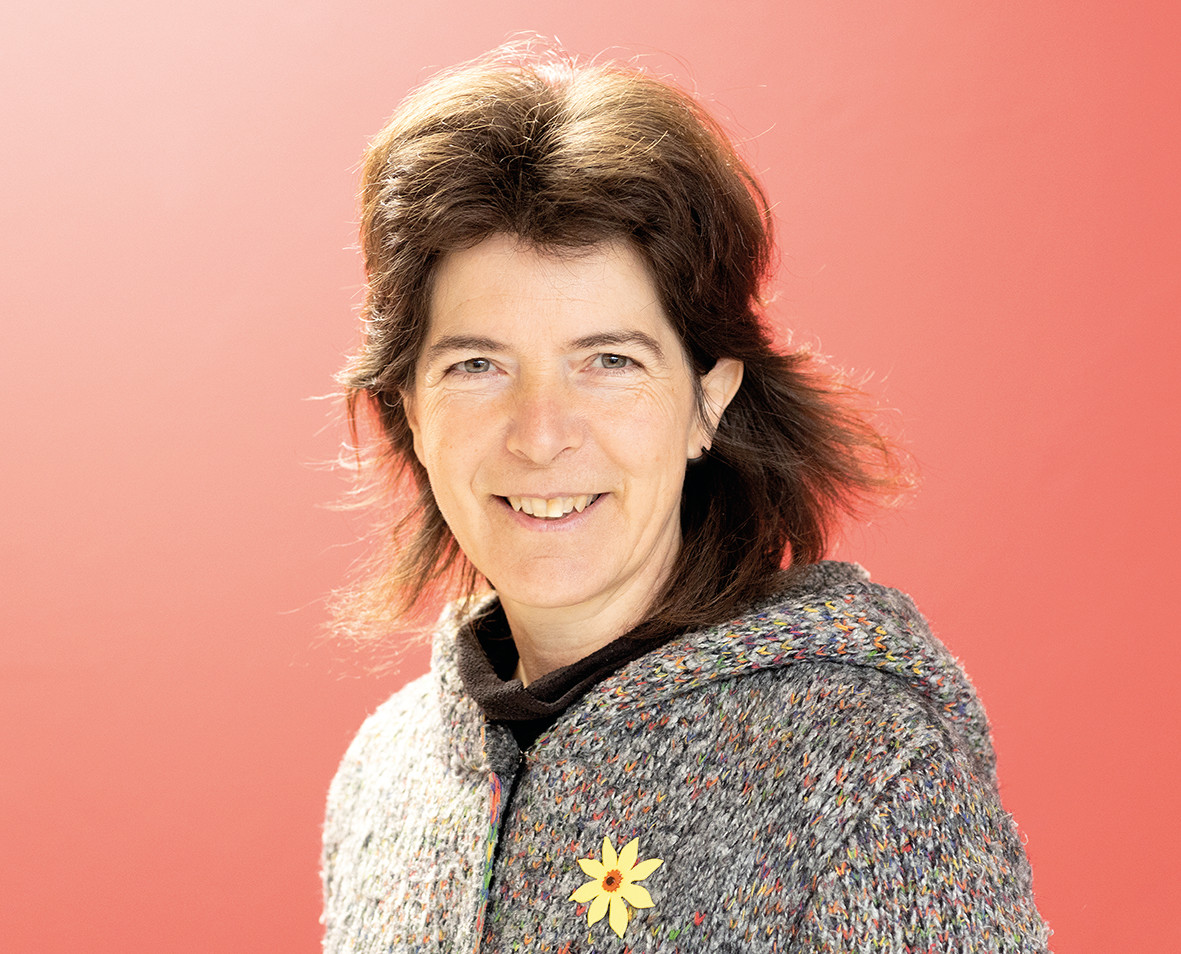
Aitziber Sarobe Egiguren
Zarautz. Biologist by training, he studied in ecology. Nature conservationist, a very young member of the natural association Arkamurka and currently a militant of Naturkon, association of ecological and naturalist groups of Gipuzkoa, in the social movement, environmentalism, militant. He is a professor at the Faculty of Humanities and Education Sciences (HUHEZI) of Mondragon Unibertsitatea.
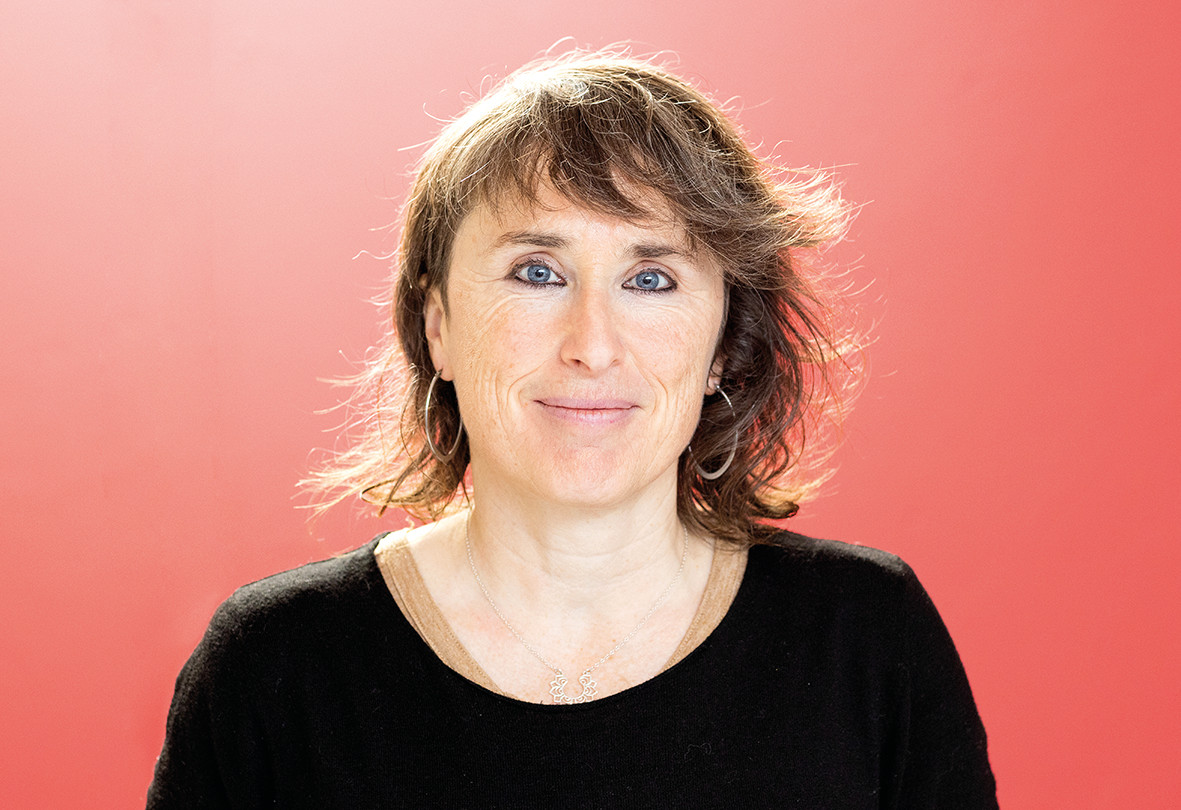
Mirene Begiristain
Born in Andoain, lives in Getaria. Militant in Food Sovereignty and Agroecology, especially in the Biolur association for organic agriculture in the last 20 years. She is a professional professor at the School of Economics and Business of the University of the Basque Country and researcher in agroecology and food systems. It observes the processes of ecosocial transition from a comprehensive perspective.

Mikel Otero Gabirondo
Born in Alkiza, lives in Vitoria-Gasteiz. He began his environmental militancy in the movement against the Leitzaran highway, and his movement against fracking meant to deepen his knowledge of the energy issue. Ex officio the firefighter for 20 years. Parliamentarian since 2016, coalition EH Bildu and secretary of Ecological Transition.
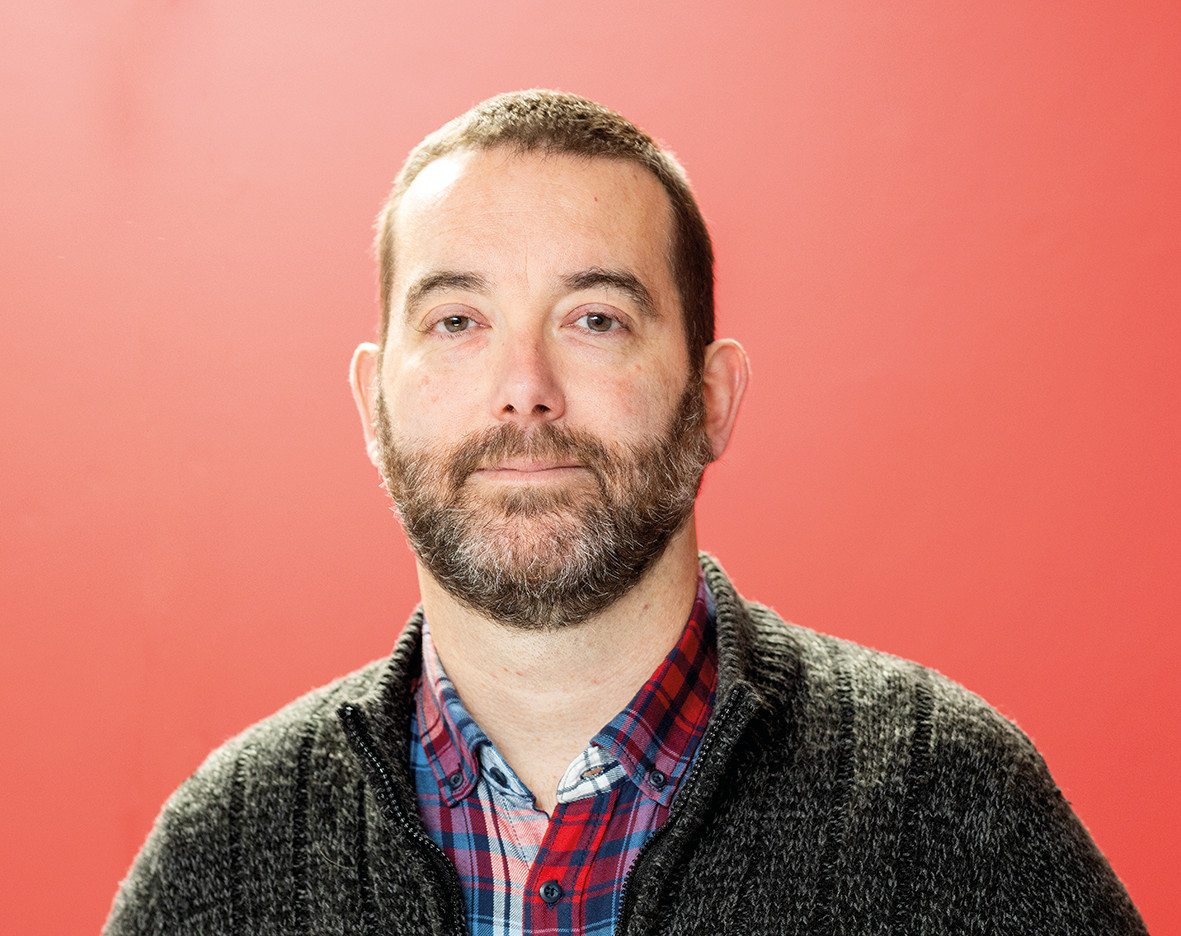
Jokin Castaños González
Born in Bilbao, lives in Galdames. He has been coordinator of the Establishment section of the Goiener Group for five years. It has knowledge of the design, development and maintenance of electricity production facilities, as well as electricity regulations and the electricity market. And it has experience in cooperativism and participatory processes of co-creation of Renewable Energy Communities.
Energiaren Nazioarteko Agentziak (IEA) astelehenean argitaratutako txostenaren arabera, %2,2 igo da energia eskaria 2024an aurreko urtearekin alderatuta, besteak beste, egiturazko arrazoi hauengatik: beroari aurre egiteko argindar gehiago erabili beharra, industriaren kontsumoa... [+]
Arratzua-Ubarrundiako "Proiektu honi ez!" plataformak adierazpen hau kaleratu du, udalerri horretako EH Bilduko hiru zinegotziek dimisioa aurkeztu berritan. Izenburu hau darama testuak: "EH Bilduren moketako politika edo Iparra nola galdu".
Arratzua-Ubarrundia (Araba) herriko EH Bilduko hiru zinegotziek dimisioa eman dute Solariaren zentral fotovoltaikoagatik. Hau da hiru zinegotziek, Txetxu Zengotitabengoak, Laura Sanchok eta Javier Ruiz de Arkautek, herritarrei zuzendu dieten agur mezua.
Eusko Jaurlaritzak eta Arabako Foru Aldundiak Datu Zentroen instalazioei ateak irekitzen dizkiete horiek arautzeko legedia sortu aurretik. Bilbao-Arasur Dantu Zentroarekin, bere lehen fasea gauzatuta, eta instalatzea amesten duen Solariaren Datu Zentroarekin, 110.000 m2... [+]
Otero jauna, garai honetan artzain honek ez du tarte handirik izaten ezertarako, justuan ibiltzen naiz, baina gaurkoan ezin utzi erantzun gabe zure azken kolaborazioa. Izan ere, sortu didan egonezinak pisua du. Haserrea ere astuna egiten zait. Ez pentsatu, ordea, dela zenbait... [+]
Martxoak 15 goizean elurrak zuritu zuen Arano. Bertako herritarrek eta ingurutik eta ez hain ingurutik bildutakoek bete zuten plaza eta elkartasunaren beroan gozatu zuten eguna: Urumeako mendietan ezarri nahi duten Euskal Herriko zentral eoliko handienaren kontrako protesta izan... [+]
Susmoa dut komunitatea hustuketa prozesu betean dagoela, eta beldur naiz, beste askori gertatu eran, mamirik gabeko bilgarri ez ote den bilakatuko, jada bilakatu ez bada. Ikustea besterik ez dago, komunitatearen izaera holistikoa gero eta modu lausoagoan heltzen da, eta Che... [+]
Herriko EH Bilduko zinegotzi eta legebiltzarkide den Ander Goikoetxeak egindako galdera parlamentario bati Jaurlaritzak emandako erantzunaren bidez jaso informazioa hau. Bi haize sorgailu ezartzeko asmoa dago eta Cluster Hernani izeneko proiektu zabalago baten barruan kokatzen... [+]
Cefiro Holdco enpresak "Domiko" deitu dion eta bederatzi makroeoliko izango lituzkeen proiektua jarri nahi du Lesaka eta Goizuetako lurretan eta ebakuazio-linea Oiartzungo azpiestaziora bideratuko luke. Espainiako Gobernuak du proiektu hau tramitatzeko eskumena.
Bolo-bolo dabil energia berriztagarrien hedapenaren inguruko eztabaida. Sarri askotan, iritsi den proiektu zaparrada desordenatuak eragindako artegatasunak bultzatuta, albiste zein iritzi-artikulu mordoaz gain, hitzaldiak, eztabaidak, mahai inguruak, bideo emanaldiak eta abar... [+]
Komunitatea bildu, pilpilean dauden gaiez hitz egin, informazioa trukatu eta beste herrien esperientziak ezagutzea da herritar kritikoek egiten duten lehen ekintza, makroeoliko bat herrian jarriko diotela jakiten duenean. Halaxe egingo dute martxoaren 13an Andoainen: mendi... [+]
Laudion, Aiaran eta Okondon izango du eragina energia azpiegiturak eta plataformaren aburuz, proiektuak eta ingurumen-inpaktuaren azterketak gabezia garrantzitsuak dituzte.







